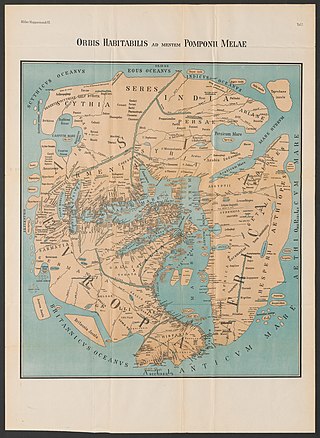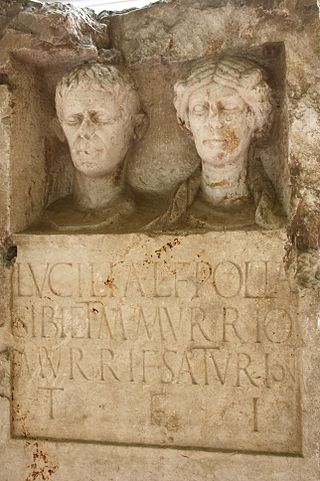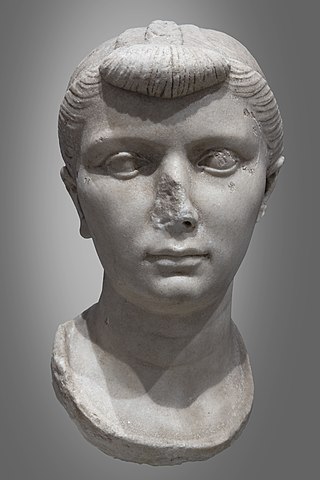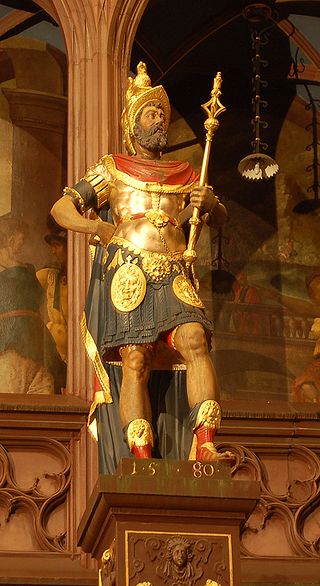
Lucius Annaeus Seneca the Younger, usually known mononymously as Seneca, was a Stoic philosopher of Ancient Rome, a statesman, dramatist, and in one work, satirist, from the post-Augustan age of Latin literature.

The Mares of Diomedes, also called the Mares of Thrace, were a herd of man-eating horses in Greek mythology. Magnificent, wild, and uncontrollable, they belonged to Diomedes of Thrace, king of Thrace, son of Ares and Cyrene who lived on the shores of the Black Sea. Bucephalus, Alexander the Great's horse, was said to be descended from these mares.
Lucius Annaeus Seneca the Elder, also known as Seneca the Rhetorician, was a Roman writer, born of a wealthy equestrian family of Corduba, Hispania. He wrote a collection of reminiscences about the Roman schools of rhetoric, six books of which are extant in a more or less complete state and five others in epitome only. His principal work, a history of Roman affairs from the beginning of the Civil Wars until the last years of his life, is almost entirely lost to posterity. Seneca lived through the reigns of three significant emperors; Augustus, Tiberius and Caligula. He was the father of Lucius Junius Gallio Annaeanus, best known as a Proconsul of Achaia; his second son was the dramatist and Stoic philosopher Seneca the Younger (Lucius), who was tutor of Nero, and his third son, Marcus Annaeus Mela, became the father of the poet Lucan.

Pomponius Mela, who wrote around AD 43, was the earliest known Roman geographer. He was born at the end of the 1st century BC in Tingentera and died c. AD 45.

Johann Friedrich Gronovius was a German classical scholar, librarian and critic.

The gens Lucilia was a plebeian family at ancient Rome. The most famous member of this gens was the poet Gaius Lucilius, who flourished during the latter part of the second century BC. Although many Lucilii appear in Roman history, the only one known to have obtained any of the higher offices of the Roman state was Lucilius Longus, consul suffectus in AD 7.

The gens Julia was one of the most prominent patrician families in ancient Rome. Members of the gens attained the highest dignities of the state in the earliest times of the Republic. The first of the family to obtain the consulship was Gaius Julius Iulus in 489 BC. The gens is perhaps best known, however, for Gaius Julius Caesar, the dictator and grand uncle of the emperor Augustus, through whom the name was passed to the so-called Julio-Claudian dynasty of the first century AD. The nomen Julius became very common in imperial times, as the descendants of persons enrolled as citizens under the early emperors began to make their mark in history.

The conspiracy of Gaius Calpurnius Piso in 65 CE was a major turning point in the reign of the Roman emperor Nero. The plot reflected the growing discontent among the ruling class of the Roman state with Nero's increasingly despotic leadership, and as a result is a significant event on the road toward his eventual suicide and the chaos of the Year of the Four Emperors which followed.

Julia the Elder, known to her contemporaries as Julia Caesaris filia or Julia Augusti filia, was the daughter and only biological child of Augustus, the first Roman emperor, and his second wife, Scribonia. Julia was also stepsister and second wife of the Emperor Tiberius; maternal grandmother of the Emperor Caligula and the Empress Agrippina the Younger; grandmother-in-law of the Emperor Claudius; and maternal great-grandmother of the Emperor Nero. Her epithet "the Elder" distinguishes her from her daughter, Julia the Younger.
Lucius Junius Gallio Annaeanus or Gallio was a Roman senator and brother of the writer Seneca. He is best known for dismissing an accusation brought against Paul the Apostle in Corinth.

Octavia the Younger was the elder sister of the first Roman emperor, Augustus, the half-sister of Octavia the Elder, and the fourth wife of Mark Antony. She was also the great-grandmother of the Emperor Caligula and Empress Agrippina the Younger, maternal grandmother of the Emperor Claudius, and paternal great-grandmother and maternal great-great-grandmother of the Emperor Nero.
Gaius Furnius was a Roman senator during the reign of Augustus, and consul in 17 BC with Gaius Junius Silanus as his colleague.

The gens Antonia was a Roman family of great antiquity, with both patrician and plebeian branches. The first of the gens to achieve prominence was Titus Antonius Merenda, one of the second group of Decemviri called, in 450 BC, to help draft what became the Law of the Twelve Tables. The most prominent member of the gens was Marcus Antonius.
The gens Caecinia was a plebeian family of Etruscan origin at ancient Rome. Members of this gens are first mentioned in the time of Cicero, and they remained prominent through the first century of the Empire, before fading into obscurity in the time of the Flavian emperors. A family of this name rose to prominence once more at the beginning of the fifth century.
Nymphæum or Nymphaion was an ancient harbour on the coast of Illyria, three miles to the north of Lissus. The site has been identified with the area of modern day Shëngjin, Albania.
The gens Catia was a plebeian family at Rome from the time of the Second Punic War to the third century AD. The gens achieved little importance during the Republic, but held several consulships in imperial times.
The gens Cestia was a plebeian family at ancient Rome during the later Republic, and in imperial times. The first member of the gens to obtain the consulship was Gaius Cestius Gallus in AD 35. The family's name is commemorated on two monuments, the Pons Cestius and the Pyramid of Cestius which survive into modern times.
Papirius Fabianus was an Ancient Roman rhetorician and philosopher from the gens Papirius in the time of Tiberius and Caligula, in the first half of the 1st century AD.

The gens Munatia was a plebeian family at Rome. Members of this gens are first mentioned during the second century BC, but they did not obtain any of the higher offices of the Roman state until imperial times.
The gens Numisia was a family at ancient Rome. Members of this gens are first mentioned in the fourth century BC, and from the second century BC to imperial times, they held a number of important magistracies. The name Numisius is frequently confused with that of Numicius, and in fact it seems probable that the two were originally the same. The Numicii of the early Republic are thought to have been patricians, and the Numisii mentioned in later sources were plebeians; but patrician families frequently developed plebeian branches over time.
![]() This article incorporates text from a publication now in the public domain : Schmitz, Leonhard (1870). "Antonius". In Smith, William (ed.). Dictionary of Greek and Roman Biography and Mythology . Vol. 1. p. 412.
This article incorporates text from a publication now in the public domain : Schmitz, Leonhard (1870). "Antonius". In Smith, William (ed.). Dictionary of Greek and Roman Biography and Mythology . Vol. 1. p. 412.









